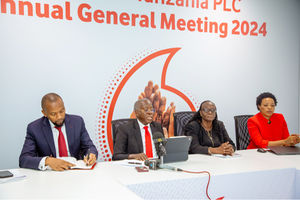Tanzania ranked poorly in issuance of building permits

What you need to know:
According to the World Bank’s 2013 Doing Business report, it is expensive to comply with legal regulations to set up a simple commercial warehouse in Dar es Salaam.
Dar es Salaam. Tanzania has been ranked poorly in the issuance of building permits for businesses.
According to the World Bank’s 2013 Doing Business report, it is expensive to comply with legal regulations to set up a simple commercial warehouse in Dar es Salaam.
Such hurdles include connecting it to basic utilities and registering the property so that it can be used as collateral or be transferred when the need arises.
With such complications, the report warns that if the costs of the compliance of building permits are kept higher, they can lead to serious constraints.
“Where complying with building regulations is excessively costly in time and money, many builders opt out,” notes the report.
To overcome constraints in searching for building permits, builders may pay bribes to bypass inspections or simply build illegally, leading to construction that puts the public safety at risk.
“Where compliance is simple, straightforward and inexpensive, everyone is better off.”
Dealing with construction permits requires 19 procedures and 206 days in Tanzania.
With such constraints, Tanzania was ranked No. 174 out of 185 countries, making it uncompetitive, even within the East African Community.
Malawi was 175th, Uganda 118th and Kenya 45th. South Africa was 39th, Botswana 132nd and Mozambique 135th.
Despite Tanzania’s poor ranking in dealing with building permits, the World Bank established that there have been little efforts to address the constraints.
At one point, the report revealed, the country decided to make the dealing with building permits worse. The government increased the number of procedures to be followed from 18 in 2009 to 19 in 2010, and these have remained unchanged to date.
Also, time taken to secure the building permit increased from 186 days in 2009 to 206 in 2010 and they have remained the same to date.
The cost incurred increased from 495.8 per cent in 2012 to 564.6 per cent of income per capita in 2013.
The report shows that since 2008 only two reforms were undertaken, in 2010 and 2013, but they made the situation more difficult.
“Tanzania introduced reforms (in 2010) that resulted in a more difficult construction permitting process with additional procedures and costs,” noted the report.
Such changes were the increase of procedures from 18 in 2009 to 19 in 2010 and the time increase from 186 days in 2009 to 206 in 2010.
The only positive change in the reform was a decrease in the cost from 718.8 per cent in 2009 to 637.9 per cent of per capita income in 2010.
In 2013 reforms, the government increased cost from 495.8 per cent in 2012 to 564.6 per cent of per capita income, while maintaining number of 19 procedures and days taken to secure the building permits remained 206 days.
The same year’s ranking witnessed Tanzania dropping from 170 in 2012 to 174 in the 2013 Doing Business report.
Architects, designers and planners say there is no justification in taking so long to be supplied with building permits.
Tanzania Association of Consultants chairman Aloyce Mushi says what is needed is the establishment of a one-stop centre so that applications and maps are worked on in as few days as possible.
“If we have the well-established and active one-stop centre, dealing with building permits will only take very few days, probably three to four,” said Mr Mushi. “Why should one take almost the whole year to get a building permit?”
According to Mr Mushi, the need for the one-stop centre for dealing with building permits is one of the areas to be proposed to the government under the ongoing study of working group by the Tanzania Private Sector Foundation (TPSF).
“We need all authorities dealing with building permits to work as a group to speed up the process. Leaving them to work as individuals will slow the process,” said Mr Mushi.
The Tanzania Civil Engineering Contractors Association (Taceca) says it’s high time the private sector pushed the government to attract more investors in construction.
Taceca executive director Clement Mworia told the BusinessWeek reporter that since a number of studies had revealed difficulties in dealing with building permits, “we commissioned TPSF to conduct the study”.
He said the study was aimed at identifying areas that needed attention for the government to address and ease dealing with building permits to attract investors.
TPSF executive director Godfrey Simbeye was quoted as saying “construction permits constraints should be dealt with if the country wants to prosper.”




